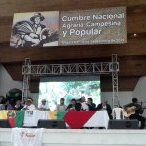English · Español

17 September 2013 | Interviews | Social activists at risk | Food Sovereignty
No step back
Colombian Community Organizations Reject Government’s “Agrarian Pact” as Meaningless
Download: MP3 (1.1 Mb)
The National Agrarian, Peasant and Popular Summit was held last Thursday in Bogota, Colombia, 25 days into the national agrarian strike and after hundreds of demonstrations all over the country. The summit assessed the repercussions of the strike and called a new meeting next month.
Nearly 3,000 peasant and other delegates (teachers, oil and transport workers, indigenous peoples) met in Bogota. Some of them included delegates of the Agrarian National and Popular Board of Dialogue and Agreement (MIA) and the National Agrarian Coordination (CAN). The aim of the meeting was to organize direct actions and to issue a joint political declaration.
The declaration reads: “The National Agrarian and Popular strike has been a breakthrough for the Colombian social movement, especially for the peasant, indigenous and black communities”.
The organizations are accusing Juan Manuel Santos’s administration of criminalizing the social protest and they said the death toll as a result of the government’s repression is very high.
Twelve people died, four were disappeared, there were 660 cases of collective and human rights violations in the country, 52 cases of harassment and threats against demonstrators and social leaders and 51 indiscriminate assaults on civilians in the country.
In an interview with Asociación Latinoamericana de Educación Radiofónica (ALER), César Jeréz of the National Assoication of Peasant Reserve Areas of Colombia said “the Summit is the beginning of a meeting point and the creation of development alternatives for the Colombian countryside”. He confirmed the call for a new summit in October.
The Agrarian Summit was held in parallel to the government’s so called “Agrarian Pact”. Jerez said the government’s call is an attempt to divert the attention, a media trick of President Juan Manuel Santos, which does not actually imply any real changes or proposals that change the difficult situation of the Colombian countryside. That is why the peasant sector did not participate in the so called “Agrarian Pact”.
Jerez said the government is proposing to consolidate the agroindustrial model of palm oil production, not a surprising proposal. It implies advancing the agroindustry interests, which have only brought misery to the regions where its model has been implemented. For this reason the striking sectors oppose it.
Source: Produced by Real World Radio/Interview: ALER.







